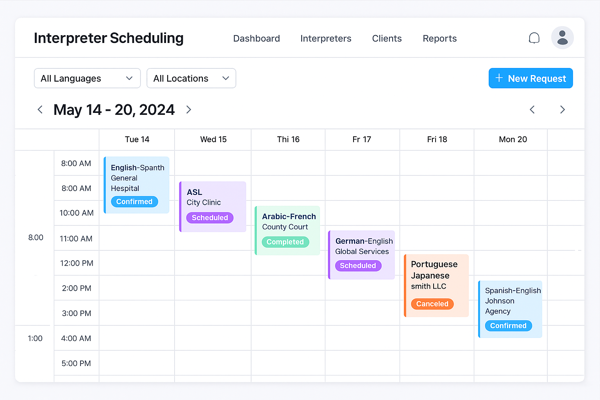Interpreter Hiring Announcement

Interpreter IO is hiring professional interpreters to support healthcare, legal, government, education, and community assignments across the United States. Most services are delivered via Over-the-Phone Interpreting (OPI), Video Remote Interpreting (VRI), and face to face interpreting.
Spanish and Arabic interpreters must be US-based, while interpreters of all other languages may apply from outside the United States. Qualified interpreters with at least one year of professional experience and relevant certifications for regulated work are encouraged to apply. Competitive rates, flexible availability, and secure scheduling are offered.
Interested interpreters may apply here.
How Does Interpreter Scheduling Software Work?

Managing interpreter schedules used to mean endless phone calls, emails, and spreadsheets.
Administrators had to track interpreter availability, assign jobs manually, and hope nothing slipped through the cracks. For hospitals, courts, schools, and language service providers (LSPs), this process was time-consuming, prone to errors, and often left both clients and interpreters frustrated.
Interpreter scheduling software streamlines the entire process by automating how jobs are created, assigned, and managed. Instead of chasing updates or juggling spreadsheets, administrators gain a single, organized system that handles bookings, reminders, billing, and reporting all in one place.
If you’ve ever wondered how this kind of software actually works behind the scenes, here’s a closer look at what happens from the moment an interpreter request comes in to the point the job is completed and recorded.
Can an Interpreter Management System Handle On-Demand Requests?
When a patient arrives at the emergency room needing urgent care, a court hearing runs late into the evening, or a school parent needs last-minute language support, there’s no time to plan ahead. These situations require on-demand interpreting, where access to a qualified interpreter must happen instantly.

For many organizations, managing these unplanned requests has always been a challenge. Traditional scheduling tools weren’t built for real-time coordination, often relying on manual phone calls or emails to locate an available interpreter. But modern interpreter management software has changed that.
So, can an interpreter software handle on-demand requests effectively? Absolutely, as long as it’s designed with the right automation, integrations, and response tools. Platforms like Interpreter IO make on-demand interpreting not only possible but seamless.
Do Interpreters Need Technical Knowledge to Use an Interpreter Management Platform?

For many interpreters, technology can feel intimidating. New systems, online portals, and digital tools might sound like they require a steep learning curve, especially for professionals who are used to managing assignments through emails, texts, or phone calls.
So it’s no surprise that one of the most common questions interpreters ask before using a new system is: “Do I need to be tech-savvy to use an interpreter management platform?”
The good news is not at all. Interpreter management platforms, like Interpreter IO, are designed with interpreters in mind. They’re built to be intuitive, easy to navigate, and supportive, so users can focus on what they do best, delivering accurate, high-quality interpreting services without worrying about complex technology.
How Long Does It Take to Implement Interpreter Management Software?

Switching to interpreter management software is one of the smartest moves an organization can make to improve efficiency and service delivery. For hospitals, courts, schools, and language service providers (LSPs), it means saying goodbye to endless spreadsheets, manual scheduling, and missed appointments and saying hello to automation, accuracy, and faster access to interpreters.
Still, one of the biggest concerns leaders have before adopting new technology is how long it will take to get everything up and running. Implementation time isn’t the same for everyone, it depends on the size of your team, how complex your interpreting operations are, and how much customization you need.
In most cases, organizations can fully implement their interpreter management software within a few weeks to a few months, especially when they’re working with a provider like Interpreter IO who prioritizes smooth onboarding and user-friendly setup.
